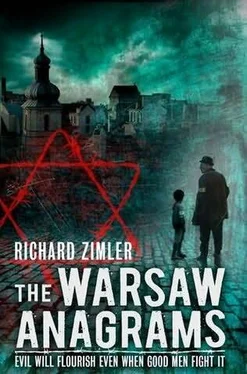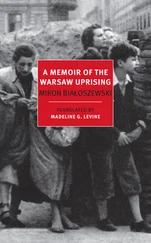‘And aren’t you scared of me?’ I asked.
‘Nah, I’ve had visions before. And besides, you speak Yiddish. Why would a Jewish ibbur do me any harm?’
‘An ibbur ?’
‘A being like you – who’s come back from beyond the edge of the world.’
He had a poetic way with words, which pleased me. I smiled with relief; he could really see and hear me. And it eased my worries to have a name for what I was.
‘I’m Heniek Corben,’ he told me.
‘Erik Benjamin Cohen,’ I replied, introducing myself as I had as a schoolboy.
‘Are you from Warsaw?’ he asked.
‘Yes, I grew up near the centre of town, on Bednarska Street.’
Puckering his lips comically, he gave a low whistle. ‘Nice neighbourhood!’ he enthused, but when he flashed a grin I saw that his mouth was a ruin of rotted teeth.
Interpreting my grimace as a sign of physical pain, he came closer. ‘Sit, sit, Reb Yid ,’ he told me in a concerned voice, pulling out a chair for me at his kitchen table.
Formality seemed a little absurd after all that we Jews had suffered. ‘Please just call me Erik,’ I told him.
I lowered myself in slow motion, fearing that I’d fail to find a solid seat, but the wood of his chair welcomed my bony bottom generously – proof that I was getting the knack of this new life.
Heniek looked me up and down, and his expression grew serious.
‘What?’ I asked.
‘You faded away for a moment. I think maybe-’ Ending his sentence abruptly, he held his gnarled hand above my head and blessed me in Hebrew. ‘With any luck, that should do the trick,’ he told me cheerfully.
Realizing he was probably religious, I said, ‘I haven’t seen any sign of God, or anything resembling an angel or demon. No ghosts, no ghouls, no vampires – nothing.’ I didn’t want him to think I could answer any of his metaphysical questions.
He waved off my concern. ‘So what can I get you? How about some nettle tea?’
‘Thank you, but I’ve discovered I don’t need to drink any more.’
‘Mind if I make some for myself?’
‘Be my guest.’
While he boiled water, I asked him questions about what had happened since I’d left Warsaw the previous March.
Sighing, he replied, ‘ Ech , mostly the same old misery. The big excitement was during the summer – the Russians bombed us. Unfortunately, the numbskull pilots missed Gestapo headquarters, but I’ve heard that Theatre Square was turned to rubble.’ He lowered his voice and leaned towards me. ‘The good news is the Americans have entered the war. The Japanese bombed them a week ago according to the BBC – I’ve a friend with a hidden radio.’
‘Why are you whispering?’
He pointed up to heaven. ‘I don’t want to sound optimistic – God might pull some more pranks on us if He thinks I’m being arrogant.’
Heniek’s superstitiousness would have provoked a sarcastic remark from me in times past, but I’d evidently become more patient in death. ‘So where do you work?’ I asked.
‘A clandestine soap factory.’
‘And you have the day off?’
‘Yes, I woke up this morning with a slight fever.’
‘What’s the date?’
‘The sixteenth of December 1941.’
It was seven days since I’d walked out of the Lublin labour camp where I’d been a prisoner, but by my count I’d taken only five days to reach home, so I’d lost forty-eight hours somewhere under my steps. Maybe time passed differently for the likes of me.
Heniek told me he’d been a printer before moving into the ghetto. His wife and daughter had died of tuberculosis a year earlier.
‘I could live with the loneliness,’ he said, gazing downward to hide his troubled eyes, ‘but the rest, it’s… it’s just too much.’
I knew from experience that the rest meant guilt, as well as more subtle and confusing emotions for which we had no adequate name.
He dropped his nettle leaves into the white ceramic flowerpot he used for a teapot. Then, looking up with renewed vigour, he asked after my family, and I told him that my daughter Liesel was in Izmir. ‘She was working at an archaeological site when the war broke out, so she stayed there.’
‘Have you been to see her yet?’
‘No, I had to come here first. But she’s safe. Unless…’ I jumped up, panicked. ‘Turkey hasn’t entered the war, has it?’
‘No, no, it’s still neutral territory. Don’t worry.’
He poured boiling water over his nettle leaves in a slow and perfect circle, and his exactitude charmed me. I sat back down.
‘Excuse my curiosity, Erik, but why have you come back to us?’ he asked.
‘I’m not sure. And I think that any answer I might be able to give you wouldn’t make much sense unless I told you about what happened to me in the ghetto – about my nephew most of all.’
‘So, what’s stopping you? We could spend all day together, if you like.’
A mischievous glint appeared in Heniek’s eyes. Despite his grief and loneliness, he seemed to be eager for a new adventure.
‘I’ll tell you a little later,’ I replied. ‘Being able to talk with you… it’s unnerved me.’
Heniek nodded his understanding. After he’d had his tea, he suggested we go for a walk. He carried a bag of potatoes to his sister, who shared a two-bedroom flat with six other tenants near the Great Synagogue, then, together, we listened to Noel Anbaum singing outside the Nowy Azazel Theatre. His accordion made the most brilliant red and gold butterfly-shapes flutter across my eyes – a glorious and strange sensation, but one I’ve gotten used to of late; my senses often run together now, like glazes overflowing their borders. In the end, might they merge completely?Will I fall inside too great a landscape of sound, sight and touch, and be unable to grope my way back to myself? Maybe that will be the way death finally takes me.
Heniek, when I hear the patient hum of the carbide lamp that sits between us, and watch the quivering dance of its blue flame, the gratitude I feel embraces me as Adam did when I told him we would visit New York together. And my gladness at being able to talk to you whispers in my ear: despite all the Germans’ attempts to remake the world, the natural laws still exist .
So I must tell my story to you in its proper order or I will become as lost as Hansel and Gretel. And unlike those Christian children, I have no breadcrumbs to mark my way back home. Because I have no home. That is what being back in the city of my birth has taught me.
First we will talk of how Adam vanished and returned to us in a different form. And then I will tell you how Stefa made me believe in miracles.
On the last Saturday of September 1940, I hired a horse-cart, a driver and two day labourers to move me from my riverside apartment into my niece’s one-bedroom flat inside the city’s old Jewish quarter. I’d decided to leave home before the official establishment of a ghetto because much of Warsaw had already been declared off-limits to us, and I hardly needed a crystal ball to know what was coming next. I wanted to go into exile on my own terms – and to be able to choose who would take over my apartment. A Christian neighbour’s university-age daughter and her barrister husband had already moved in.
In my best woollen suit, I walked closely behind the horse-cart, making sure that nothing slipped off into the mud. My oldest friend, Izzy Nowak, joined me, hoping to escape his dispiriting home for a little while; his wife Róźa had suffered a stroke earlier in the month and could no longer recognize him. Róźa’s younger sister had moved in to help take care of her.
Читать дальше












